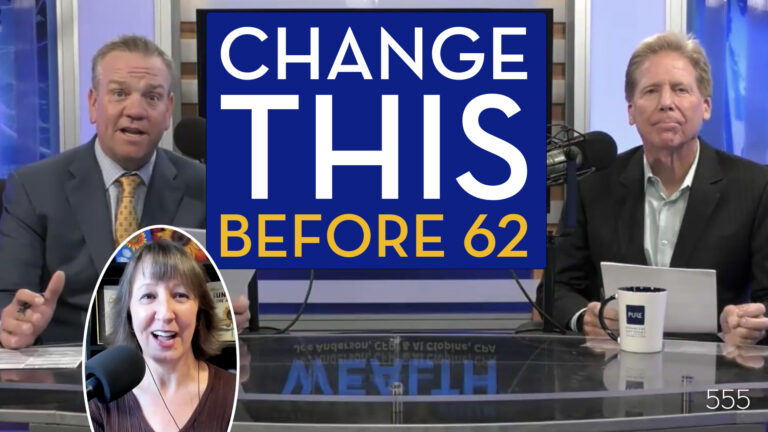Dividend paying stocks: do you understand how they work? In YMYW podcast episode 84, Joe Anderson, CFP® and Alan Clopine, CPA answer your biggest financial questions, from how to claim a loss on a Roth IRA to the pros and cons of rolling over an employee retirement plan into an IRA (individual retirement account). Original publish date November 19, 2016 (hour 2). Note that content may be outdated as rules and regulations have changed.
02:04 “Most [people] don’t understand that when the dividend is paid, the stock price falls by that amount.”
04:55 “It’s not necessarily the best idea to focus solely on dividend paying stocks…with dividend paying stocks you’re paying taxes as you go.”
06:58 “It’s only a matter of time that the dividend stock prices go up because of demand.”
11:05 “I have a Roth IRA, open for over ten years now. I have contributed about $15,000 but lost about 80% of it due to some stocks that I invested in. Can I claim this 80% loss in my tax return?”
15:39 “I was recently told by more than one financial advisor that I should roll my employee retirement plan now that I’ve left the company, into an individual IRA. When I called that company to do just that, I was told by their advisor not to roll it over. He explained that I began investing in 2007/2008 when the market was low. If I were to roll over into an individual IRA today, I would be buying in when market prices are high, thus buying fewer stocks/bonds (whatever prices comprise the plan). He also said, since your plan has averaged a 5.1% gain this year, why would I want to lose that? Can someone speak to this logic for NOT rolling over?”
24:43 “Are profits from trading options (or stocks) in a non-qualified brokerage account subject to the 10.4% FICA tax?”
26:41 My wife and I are both 60 years old. We have taxable investments valued at $900,000, 401k and IRAs valued at $1,200,000, and a Roth valued at $23,000. We would like to retire in about 8 years. A co-worker said he heard that it is possible to pay no income tax in retirement, even on Social Security benefits. With my situation how is that possible?”
32:21 “A lot of people retire at 62 or 64 and are in a very low [tax] bracket, and could be doing Roth conversions all the way until age 70 1/2 and then be in a much better spot and in some cases pay little to no taxes.”
Listen to the YMYW podcast:

Amazon Music
AntennaPod
Anytime Player
Apple Podcasts
Audible
Castbox
Castro
Curiocaster
Fountain
Goodpods
iHeartRadio
iVoox
Luminary
Overcast
Player FM
Pocket Casts
Podbean
Podcast Addict
Podcast Index
Podcast Guru
Podcast Republic
Podchaser
Podfriend
PodHero
podStation
Podverse
Podvine
Radio Public
Rephonic
Sonnet
Spotify
Subscribe on Android
Subscribe by Email
RSS feed

YouTube Music
IMPORTANT DISCLOSURES:
Pure Financial Advisors is a registered investment advisor. This show does not intend to provide personalized investment advice through this broadcast and does not represent that the securities or services discussed are suitable for any investor. Investors are advised not to rely on any information contained in the broadcast in the process of making a full and informed investment decision.
• Investment Advisory and Financial Planning Services are offered through Pure Financial Advisors, LLC, a Registered Investment Advisor.
• Pure Financial Advisors LLC does not offer tax or legal advice. Consult with your tax advisor or attorney regarding specific situations.
• Opinions expressed are not intended as investment advice or to predict future performance.
• Past performance does not guarantee future results.
• Investing involves risk including the potential loss of principal. No investment strategy can guarantee a profit or protect against loss in periods of declining values.
• All information is believed to be from reliable sources; however, we make no representation as to its completeness or accuracy. As rules and regulations change, content may become outdated.
• Intended for educational purposes only and are not intended as individualized advice or a guarantee that you will achieve a desired result. Before implementing any strategies discussed you should consult your tax and financial advisors.
CFP® – The CERTIFIED FINANCIAL PLANNER™ certification is by the Certified Financial Planner Board of Standards, Inc. To attain the right to use the CFP® designation, an individual must satisfactorily fulfill education, experience and ethics requirements as well as pass a comprehensive exam. Thirty hours of continuing education is required every two years to maintain the designation.
AIF® – Accredited Investment Fiduciary designation is administered by the Center for Fiduciary Studies fi360. To receive the AIF Designation, an individual must meet prerequisite criteria, complete a training program, and pass a comprehensive examination. Six hours of continuing education is required annually to maintain the designation.
CPA – Certified Public Accountant is a license set by the American Institute of Certified Public Accountants and administered by the National Association of State Boards of Accountancy. Eligibility to sit for the Uniform CPA Exam is determined by individual State Boards of Accountancy. Typically, the requirement is a U.S. bachelor’s degree which includes a minimum number of qualifying credit hours in accounting and business administration with an additional one-year study. All CPA candidates must pass the Uniform CPA Examination to qualify for a CPA certificate and license (i.e., permit to practice) to practice public accounting. CPAs are required to take continuing education courses to renew their license, and most states require CPAs to complete an ethics course during every renewal period.









